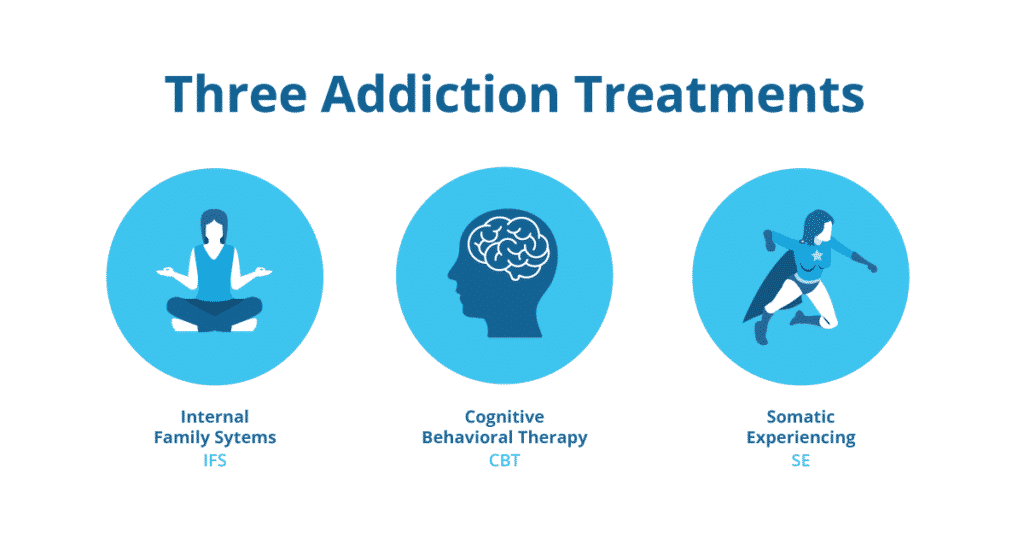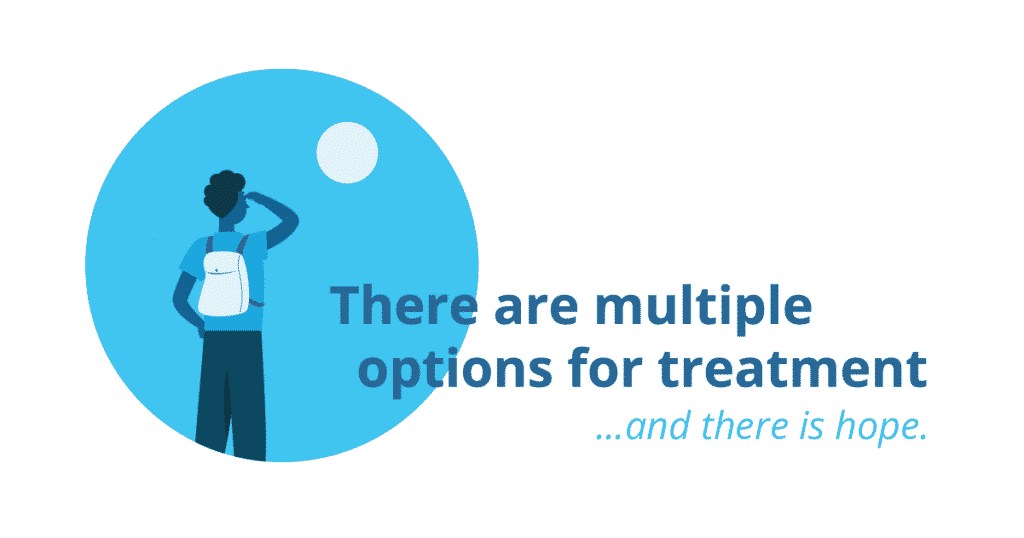When you enter substance abuse treatment, you might wonder what treatment options are available to you. There are a plethora of treatment programs that specialize in specific types of treatment, everything from motivational interviewing and contingency management to twelve-step-based therapies. Some treatments are holistic, alternative, and focus on spirituality, while others are evidence-based with a strong foundation in research. Your treatment options include group therapy, family therapy, and individual therapy.
Some treatment facilities focus on creating support groups for people in recovery from drug or alcohol addiction, while other therapies aim to reduce cravings. This article examines three treatments commonly used in drug addiction treatment: Internal Family Systems Therapy (IFS), Cognitive-Behavioral Therapy (CBT), and Somatic Experiencing (SE) Therapy. These three therapies specifically treat addiction and co-occurring diagnoses such as depression, anxiety, or post-traumatic stress disorder.

Internal Family Systems Therapy
Internal Family Systems Therapy (IFS) is a trauma-informed, evidence-based treatment that focuses on connecting you to your highest Self. IFS operates from the premise that a natural part of the human condition is that we are all comprised of “parts.” Parts are like autonomous personalities within you, and they each want the very best for you. This philosophy is to be distinguished from dissociative identity disorder (previously known as multiple personality disorder), in which there is a dissociation between parts of the self with no memory of when alternate personalities emerge. IFS understands all humans to have parts and the therapy facilitates healthy relationships between the parts of ourselves.
In IFS, parts fall into categories; some parts are protector parts that developed to implement strategies to keep you safe from ways you’ve been harmed in the past. Other parts within you are exile parts that carry the pain of the traumas you’ve experienced in the past. And a core premise of IFS is that within each of us is a “Capital S” self (or higher self), a part of the Self that is loving, wise, patient, and connected. The goal of IFS is to enhance your relationship with your higher Self and to compassionately allow your higher Self to give love, attention, guidance, and attentiveness to your protector and exile parts. This experience is known as Self-leadership.
The process of IFS is similar to a guided meditation in which a trained and experienced practitioner guides you to become aware of each of the different parts within you. This therapy is especially helpful in addiction treatment because a core struggle of having an addiction is that one part of you craves the substance or behavior you are addicted to, while another part wants sobriety. These two parts within you can conflict with one another, and often one part “wins” at the expense of the other. This experience can be exhausting. It can lead you to distrust your decision-making and explain why relapse occurs during the addiction process.
When you strengthen your Self-leadership, you have more confidence in making decisions. When receiving treatment in IFS, you’ll know that you are connected to your higher Self when you the 8 C’s of Self-leadership: Confidence, calmness, creativity, clarity, curiosity, courage, compassion, and connectedness. From this state of being, you can welcome and connect to all parts of yourself, allow them space to share their perspective, and give them the guidance and love they need. This therapy increases your sense of self-trust and helps you compassionately understand your addiction while moving toward the sobriety you seek. IFS might be the right therapy for you if you find that you have behaviors you don’t understand, ambivalence, mixed emotions, or a strong inner critic.
Cognitive-Behavioral Therapy
Cognitive-Behavioral Therapy (CBT) is a type of therapy that focuses on how you think. The premise in CBT is that before a behavior, you have a thought. This thought generates emotion and guides your behavior. When it comes to addiction recovery, CBT helps you become familiar with the thoughts that sabotage your goal for sobriety. For example, although you might be highly motivated for sobriety, when you encounter a trigger, you might notice that an automatic thought tells you, “I can have this just one last time.” Or, “I don’t really care.” The thoughts that sabotage your recovery can take many forms, such as, “I deserve to have this.” Or, “I already slipped. I might as well have as much as I can today and start again tomorrow.”
CBT operates on the premise that although you have sabotaging automatic thoughts, you have the power to respond to these automatic thoughts with helpful sober thoughts. You cannot control your automatic thoughts; they arise on their own. However, the more you respond to your automatic thoughts with helpful responses that support sobriety, you reduce the frequency and intensity of your automatic thoughts.
CBT explores non-beneficial thinking patterns known as cognitive distortions. These distortions are common to all people and can cause significant distress. Below are examples of how cognitive distortions can hinder your recovery:
- All or nothing thinking: Example: “I already had a little bit, so I might as well have it all.”
- Negative fortune-telling: Example: “Since I have an addiction, I’ll never be able to be sober.”
- Overly positive fortune-telling: Example: “I’ll be able to have just a little bit of what I’m craving and feel satisfied.”
- Emotional reasoning: Example: “I feel like I had a bad day, and I deserve a reward.”
- Mind reading: Example: “People will think I’m straight-edge if I don’t drink at the party.”
- Self-deluding thinking: Example: “No one will know, so it doesn’t matter.”
- Unhelpful rules: Example: “I already bought this; I already spent the money, so I might as well have it.”
- Justification: Example: “It’s okay to use this substance because my friend paid for it.”
- Exaggerated thinking: Example: “I can’t stand feeling like this! I have to have it right now.”
Before identifying your cognitive distortions, they might hold a significant degree of power over your emotions and behaviors. However, by identifying your distortions, you can see that these thoughts are just notions, not necessarily truths. Therefore, you can respond to your distorted thinking with an alternate helpful response that reduces the intensity of your emotions and the compulsions of your behaviors.
CBT not only helps with addiction recovery; it also illuminates thought patterns that occur with other diagnoses such as depression or anxiety. CBT might be the proper treatment approach for you if you benefit from the clarity, understanding, and making sense out of a situation. Those who gravitate toward logic and reasoning as a means of healing may especially appreciate the approach of CBT.
Somatic Experiencing Therapy
An alternate to cognitive behavioral therapy is body-based somatic therapy. Somatic Experiencing (SE) therapy is a body-focused therapy rooted in neuroscience, physiology, evolutionary psychology, and indigenous healing practices. SE operates on the premise that when we experience trauma, the shock remains in our nervous system until we actively discharge it. Somatic Experiencing therapy provides us with the ability to experience that discharge.
SE is a treatment created to treat trauma. However, it’s commonly used in addiction treatment because of the strong connection between trauma and addiction. The theory of SE is based on stress physiology, the flight, flight, and freeze response that occurs when we encounter a threat. Understanding the flight, flight, and freeze responses is beneficial in early treatment because detox and withdrawal are stressful. When you enter treatment, you might find yourself argumentative with staff (fight response), feeling a strong desire to leave treatment (flight response), or feeling more depressed than when you initially entered treatment (freeze response). These responses are a natural part of the process of recovery, and knowing to expect them can be beneficial to your long-term recovery.
SE is a subtle approach as it does not directly talk about the trauma. SE believes that talking directly about a circumstance can generate the very fight, flight, or freeze response you are working to discharge. Your therapist will encourage you to become acquainted with your body during an SE session. The therapist will support you in discovering how (and where) your emotions are felt in your body. Your therapist will guide you through several exercises such as: mindfully orienting to your environment through your senses, gentle body-tapping exercises, and tracking how your body tenses and relaxes related to your thoughts.
SE might be the right approach for you in you relate to the following:
- You dissociate when thinking or talking about traumatic memories.
- You hold tension in your body and experience health conditions such as headaches, shallow breathing, high blood pressure, or other markers of chronic stress.
- You ruminate on a situation and feel stuck in analysis.
- You are especially logical and use reason as a means to disconnect from your body.
- You gravitate toward somatic healing modalities such as yoga, Tai Chi, Chi Gong, or dance therapies.

There is Hope
Drug and alcohol addiction affects your life in significant and painful ways. And, there is hope. People in recovery experience long-term sobriety every day. There are multiple approaches to drug addiction treatment, and finding the right treatment can be paramount in your recovery. It is helpful to align with the philosophy that underlies a specific treatment modality. For more information about drug addiction treatment options, visit the National Institute on Drug Abuse. Or, you can check out your local Alcoholics Anonymous or Narcotics Anonymous Meetings. For personalized feedback, call us today to speak with an addiction specialist who can learn about your unique situation to help you discover what types of treatment are right for you. The Haven New England is here for you.



